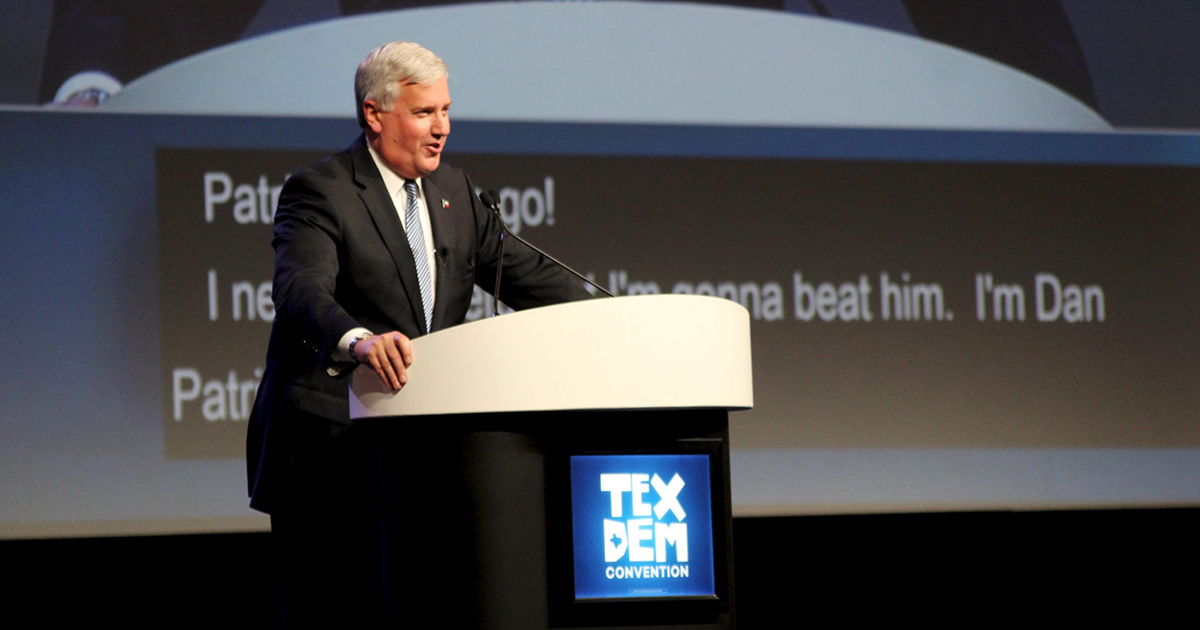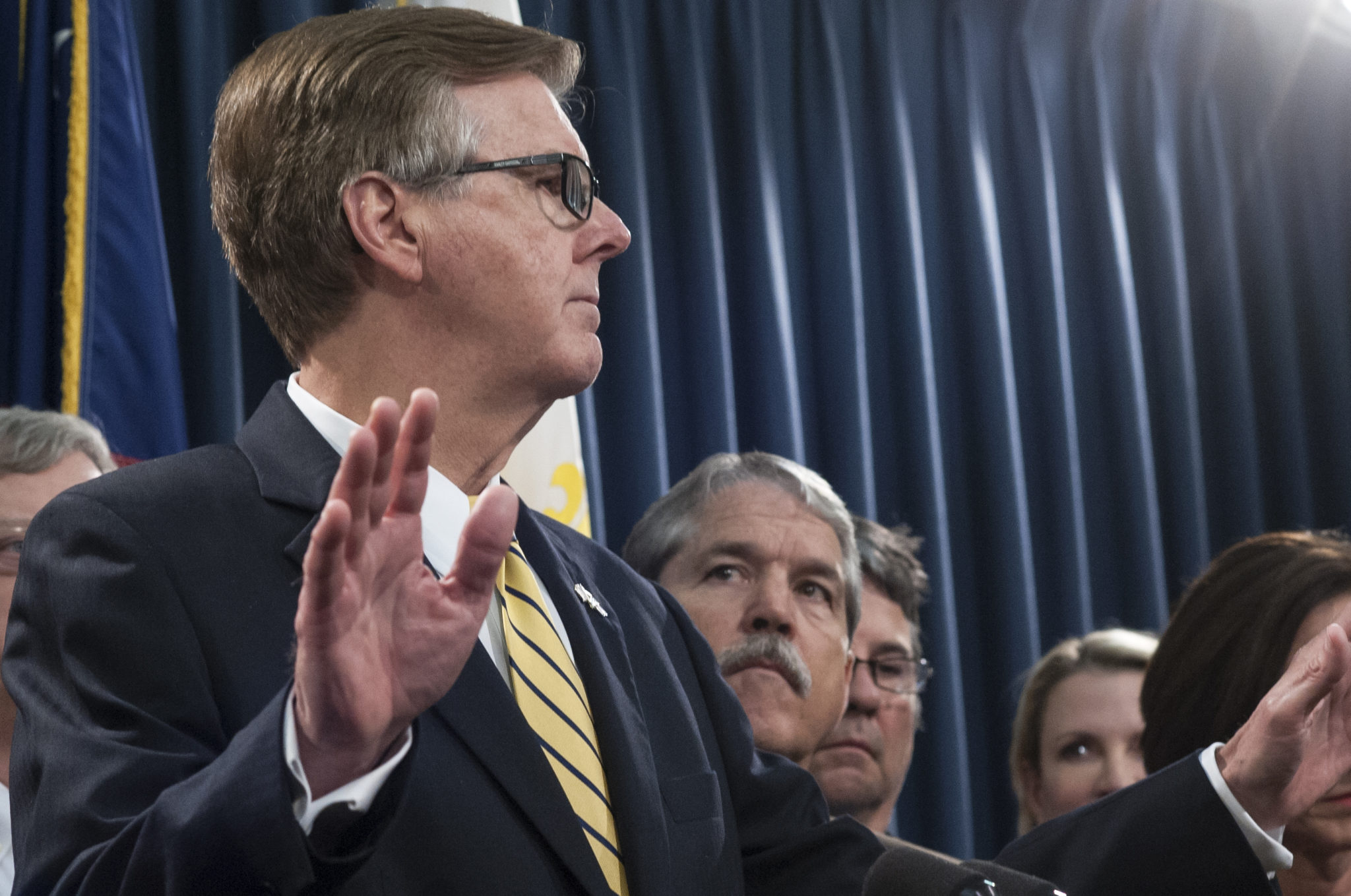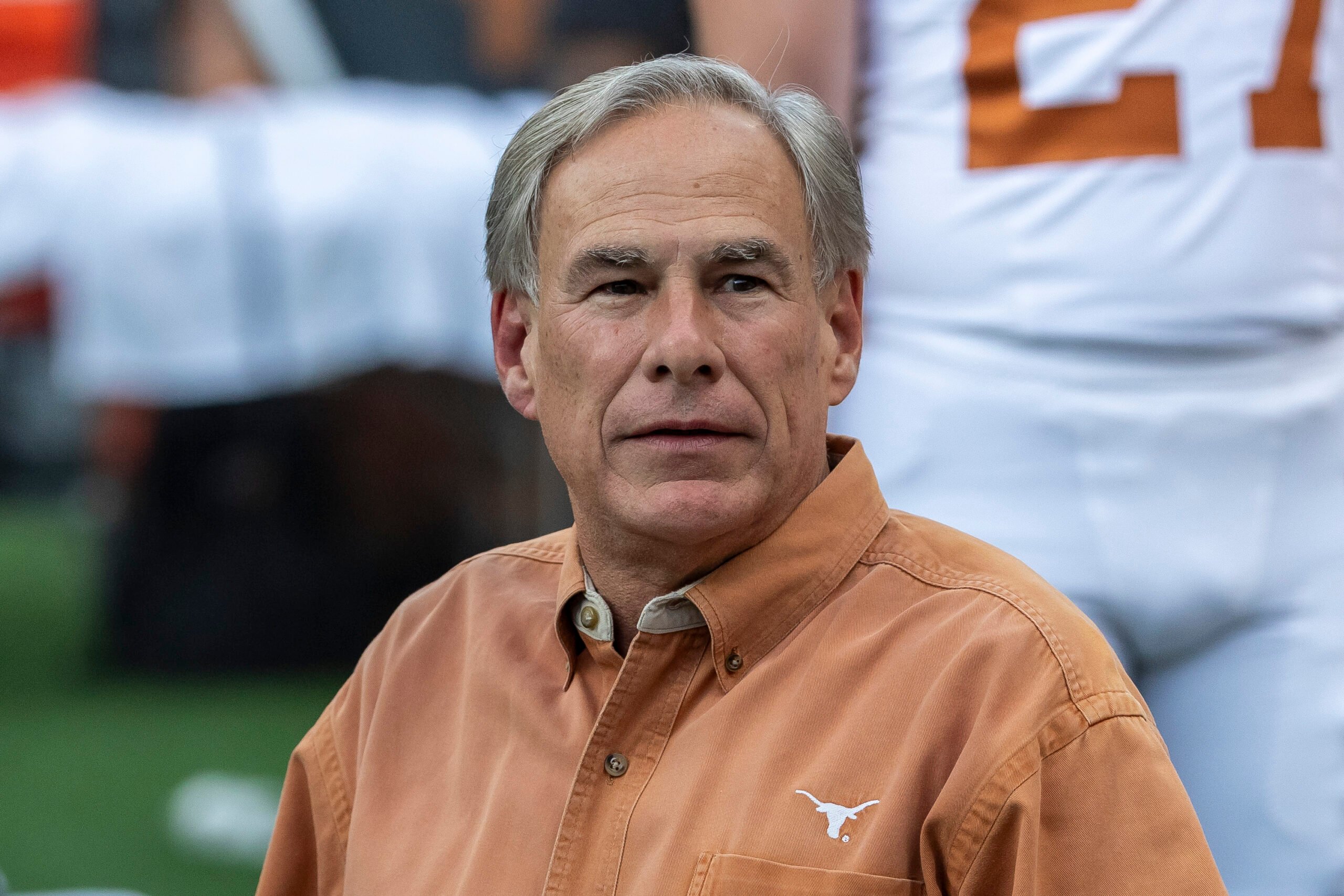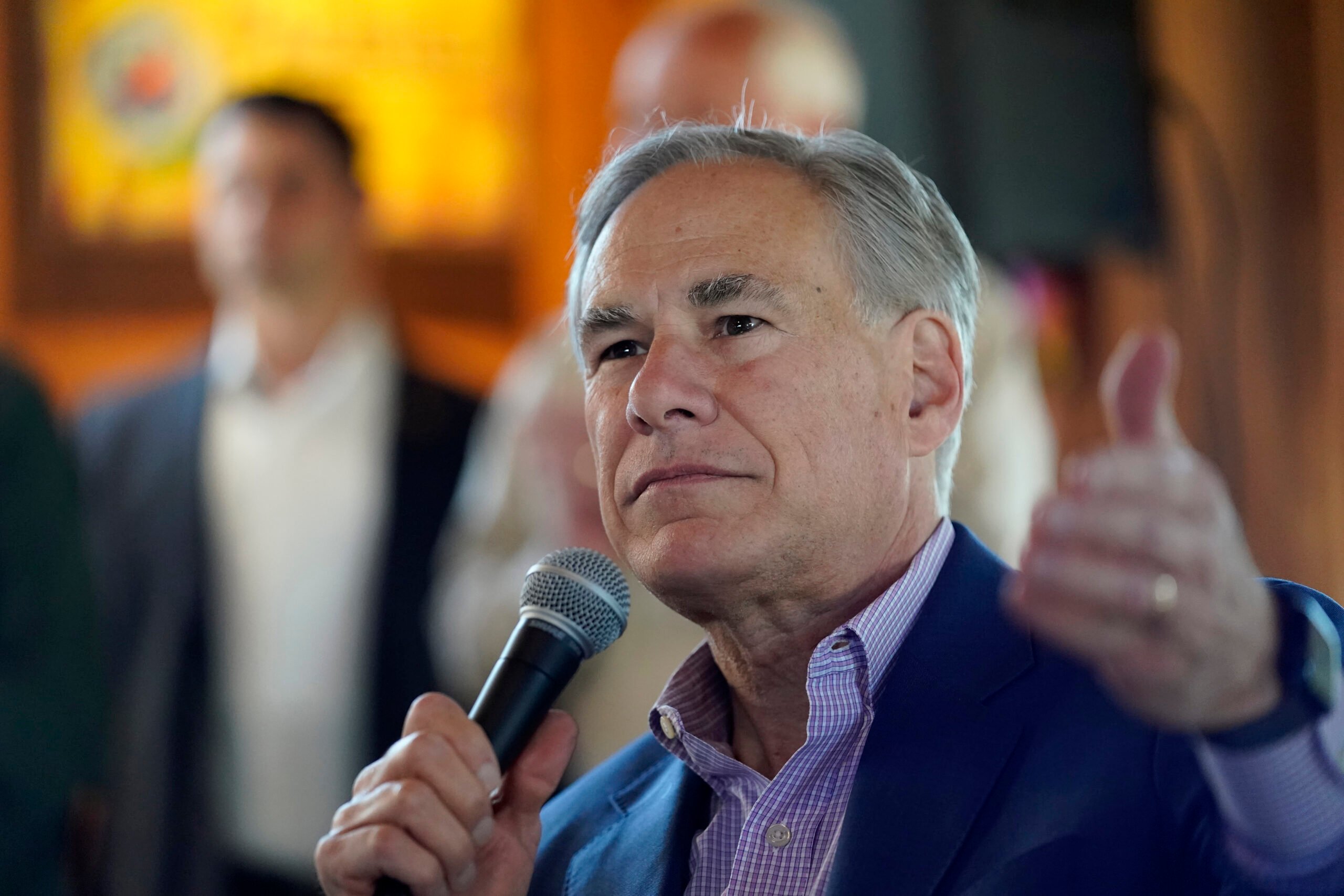
Mike Collier Has a Problem: Dan Patrick Ain’t Taking His Bait
If his campaign is to gain momentum in the roughly three months before Election Day, Collier needs to smoke Patrick out of the hole he’s hiding in — and fast.

Mike Collier has been publicly trying to get a rise out of the usually bombastic Texas Lieutenant Governor Dan Patrick ever since he launched his campaign to unseat him in June 2017. More than a year later, he’s largely failed to do so.
It’s not for a lack of trying. At the Texas Democratic Convention in Fort Worth in June, the Democratic nominee for lieutenant governor lit up the arena with a speech that took several whacks at Patrick.
“Now when it comes to creatin’ jobs, who are you gonna trust?” he asked. Patrick, a “once-bankrupted radio shock jock from the East Coast whose hair is fake, his name is fake and his pickup truck is fake.” Or himself, a “30-year business leader who went to public schools here, marched in the Longhorn band; my hair is real, my name is real and my Ford F-150 is real.”

A former Republican, corporate accountant and 2014 Democratic state comptroller candidate, Collier’s campaign centers on trolling Patrick about his myriad policy failures and toxic politics. “I think he’s really an awful, awful leader,” Collier told the Observer. “He doesn’t share our values, he doesn’t try to solve problems, his modus operandi is to pit one Texan against another and stir up anger and try to turn votes out of that. It’s just repulsive.”
He’s positioning himself as the foil to Patrick’s reactionary brand of conservatism: quarterly revenue forecasts, not bathroom bills. Collier’s core campaign message is that he’d bring competency back to Texas state government. Collier pitches himself as an earnest wonk to the point that it’s become a trope. He’s the accountant, the problem solver, the newly politicized technocrat who sees internal audits and more accurate revenue forecasts as the path back to normalcy in the Texas statehouse.
To do so, he needs Patrick to take his bait and try to defend his record — and fast. Otherwise, Collier is just another unknown, underfunded Democratic candidate howling in the wind. The lieutenant governor, one of the most outspoken conservative crusaders in Texas politics, clearly knows this and, for the most part, has kept his political powder dry. Over the past several months, Patrick has maintained an uncharacteristically low profile, popping his head out only from time to time. At his party’s state convention in June, he declared that conservatives had won the Texas GOP civil war — though he refused to talk about his failed bathroom bill.
“Patrick doesn’t try to solve problems, his modus operandi is to pit one Texan against another and stir up anger and try to turn votes out of that.”
And then earlier this month, Patrick announced that he’d personally donate 10 metal detectors to the Santa Fe Independent School District, where 10 people were killed by a mass shooter, while at the same time slow-walking any sort of legislative response. Collier says Patrick did what he always does: “form a committee, ask for a report and grind progress to a halt.” Just this week, Patrick came out firmly against “red flag” laws. (In response, Collier sent out a press release saying, “Only a coward would put the lives of Texas students at risk just to keep the power brokers happy.”)
Breaking with Ted Cruz and Greg Abbott, Patrick preemptively declined any sort of debate with Collier. “It’s no secret Lieutenant Governor Patrick relishes debates, but since his opponent shows no sign of grasping even the most basic rudiments of state government, our campaign has no plans to debate him,” Allen Blakemore, Patrick’s top political aide, told the Texas Tribune in a statement. “There isn’t anyone in the Lone Star State who isn’t absolutely clear about where Dan Patrick stands on the issues.”

Collier’s argument is that Patrick is not only a uniquely vile Republican, but a uniquely vulnerable one, too. He points to the fact that Patrick’s primary opponent Scott Milder, who had little money and no name recognition, pulled 24 percent of the GOP vote back in March. Despite spending $10.5 million in the primary, Patrick’s approval rating remains parked around 35 percent. A recent poll found that Collier was trailing Patrick by only 6 percentage points — half the margin of that in the governor’s race — providing fodder for his campaign’s viability and Patrick’s weakness.
Collier’s platform is centered on the intertwined local property tax crisis and the woeful state public school finance system, two areas of state government that Patrick is intimately involved in. “By blowing holes in our revenue systems, and then borrowing billions and driving debt service costs up, the state has made a complete hash of our finances. We simply don’t have enough money to make ends meet,” he wrote this week. “State finance is the very face of fiscal irresponsibility, and it’s one of the reasons I quit the Republican Party back in 2013 and asked the Democrats for help.”

Collier says Texas can generate $15 billion in state revenue “without raising a penny in taxes” by expanding Medicaid, reining in health care costs and closing a property tax loophole that allows big corporations to use their legal and political muscle to force through lower property appraisals. He wants to apply the $15 billion toward fixing the state’s school finance system, restoring retired teachers’ benefits, cutting class sizes, improving school security and mental health services, creating a pre-K program and restoring women’s health services.
Patrick’s unwillingness to debate Collier is the calculation of an incumbent on his heels. Recall that Patrick debated his Democratic opponent, Leticia Van de Putte, in 2014 and even debated then-San Antonio Mayor Julián Castro over immigration policy, just for fun. Now, he has a lot to lose and little to gain from having to defend his anti-trans bathroom crusade on TV for potentially millions to see. With a huge incumbency advantage and an inherently favorable electorate, he has absolutely no incentive to engage with Collier on anything. Property taxes might be soaring around the state, but Patrick’s betting there’s nary a normal Texan who’d directly associate that with his record as lieutenant governor— and he’d prefer to keep it that way, for good reason. Patrick has blamed local officials for rising property taxes, passed toothless relief bills that don’t do anything, all while avoiding the real problem: the GOP’s endless anti-tax fervor has made it so that the state doesn’t have enough money to fund public education and other services.
Collier needs to amplify the contrast between him and Patrick, but he has little statewide name recognition and even less campaign cash with which to get out his message. Patrick has 233 times as much cash on hand than Collier, according to the latest fundraising reports — Patrick has about $4.5 million in the bank, compared with Collier’s paltry $60,000. Blakemore, Patrick’s consigliere, tweeted out the news with the hashtags #NoHat #NoCattle.
In late June, at a campaign event in Wimberley with Steven Kling, the Democrat running against state Senator Donna Campbell, Collier was making his pitch to a crowd of a few dozen local Democrats. Toward the end of the event, an older woman in the front row implored, “How are you going to get this word out?… Do y’all have enough money to do it? I’m sitting here and the clock is ticking until November and I’m panicked.”
Collier went through his spiel about how the polls show him closing in, how Patrick’s numbers are stagnant and how he is on the right side of every issue voters care about.
“But do people know that?!” the woman implored.
To that, Collier recalled a piece of advice a political consultant gave him during his 2014 campaign. “If you want people to vote for you because they like you, that will cost you $10 million. But if you want people to vote for you because they don’t like him, that will only cost you one, maybe two [million dollars],” he said. “We will win because Texans are tired of what they’re getting and they’re looking for an answer.”


